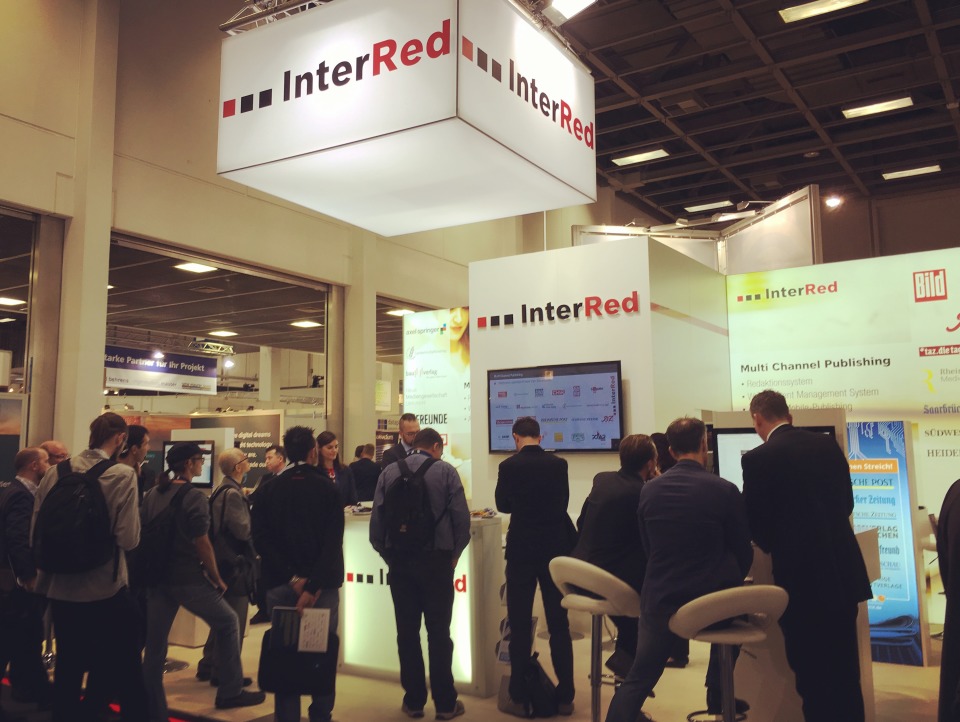Siegen/Berlin, 17.09.2018
Multi Channel Publishing Solution InterRed at the Digital Content Expo (WAN-IFRA)
InterRed will present the latest version of its multi-channel publishing solution of the same name at the Digital Content Expo / World Publishing Expo of WAN-IFRA in Berlin. From 09 to 11 October 2018, the comprehensive solution from planning to output will be presented at Stand C.05 in Hall 21b. In addition, an exclusive insight into the newly developed and modernized user interface will be provided.

Publishing solution for planning to output
Digital Content Expo 2018 is dedicated to content creation, content distribution, content monetisation and content services. The InterRed solution, which combines (web) content management and editorial system, provides the basis for efficient publishing from planning to output. Starting with the (browser-based) planning, creation and administration of content, through cross-media publication and distribution in different print and digital channels to the implementation of successful business models, InterRed forms the backbone of the vertical value chain on the software side and as a full service provider. The multi-channel publishing solution InterRed is thus used successfully both by publishers (newspapers, magazines) and by companies in the corporate publishing sector (communication and marketing departments). At DCX 2018 InterRed will now present a first preview of the long-awaited new Graphical User Interface (GUI) as well as the integration of the Duden spell checker.
Duden integration and first preview of new user interface
InterRed integrates the spelling and grammar checker of the Duden Correction Server from EPC and thus the German spelling standard into its publishing solution. In InterRed's media-neutral, browser-based editor, spelling mistakes (red underlined) and grammar mistakes (green underlined) can now be pointed out while retaining the familiar correction workflow. With a few clicks, correction suggestions can be displayed or, alternatively, new words can be added to the central and uniformly maintained dictionary administration. In addition, InterRed users can choose between the previously integrated spell checker and the Duden solution.
The new design of the browser-based interface is optimally tailored to the needs of InterRed users. Depending on the assigned rights and roles, each user only sees the required functions, as before. This leads to more clarity and greater efficiency, not least thanks to the even more ergonomic design. In addition, users can show and hide individual areas themselves and personalize them themselves.
InterRed uses the MVC approach (Model View Controller), which greatly simplifies the further development and implementation of new features. In addition, the new interface will be responsive - in addition to the already available options such as the native InterRed ContentCollector app, the solution can also be operated from smartphones, tablets, notebooks or other devices. This also includes integrated, cross-media topic planning.
Cross-media topic planning and control with efficiency control
The integrated topic planning enables the comprehensive conception, organization and coordination of topics directly in the browser-based editorial system. The assignment of topics is cross-media for different output channels (e.g. print, online or app), different display types enable an efficient overview of current or future planned topics. At the same time, the existing task management serves to define responsibilities and optimize coordination processes. One of the main features is efficiency control by checking the content of a topic. This is possible for topic coverage, i.e. internal data sources and content already available in the company, as well as for a unique position, i.e. external media such as other websites that are used for comparison purposes. The comparison of the extent to which a planned topic is already covered in the company's own content pool or by competitors leads to the avoidance of multiple productions and a fine-grained topic specialization.




